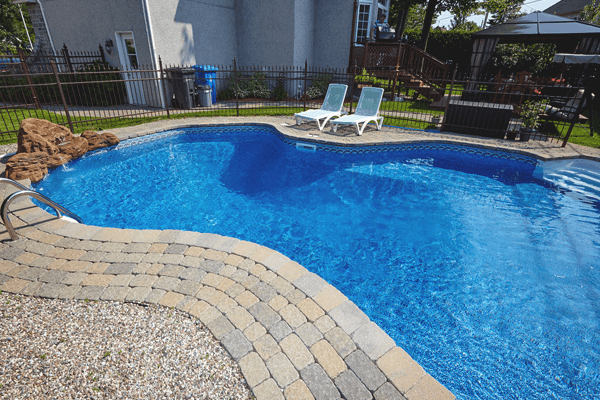There’s a lot buzzing out whether saltwater pools are more reliable or chlorine pools, namely traditional pools. Therefore, what should eventually take place in your backyard?
The concept of saltwater pools is interesting. This can give you the same feeling as swimming in the ocean. Generally, chlorinated pools are smelly and can have health risks as well. In contrast, saltwater pools are easy to maintain, good for the eyes and skin.
In this article, we’ll clear some misconceptions along with the pros and cons to decide: Should you buy a saltwater pool?

Read More: Do Salt Water Pools Kill Bacteria
Advantages of Saltwater Pools
Easy to maintain: Saltwater pool makes it easy when it comes to maintenance. You only need to take care of the chlorine and pH level, and the rest will solve automatically. No need to add chemicals; salt cells will provide the necessary chlorine as needed. Besides, clean your pool once a year. Simply scrub, change the filter and water and drain the pool.
Cost-Effective: We won’t tell you a lie; it is expensive to maintain a saltwater pool. However, excluding the fact of buying saltwater generators, it is cost-effective ultimately. Homeowners save a lot of money establishing saltwater pools. They don’t have to think about buying chemicals repeatedly.
Disadvantages of Saltwater Pools
Before you buy your saltwater pool and start enjoying day and night, hold on a sec. There are few cons you need to consider. Let us help you.
Corrosion: In a salt water system, we get chlorine through the reaction of salt in an electrolytic cell. Sometimes pool water becomes corrosive and over-chlorinated due to extensive amounts of sodium hypochlorite. This is a major concern as it affects the driving board and the ladder. Bear in mind that saltwater can attack cement, landscaping adjacent to the pool, and other materials also.
Health and Environmental issues: Saltwater pools have a lot of chemical agents which human skin absorbs every now and then. Highlights major health risks as saltwater have sodium in it. The main concerns are high blood pressure, history of stroke, circulatory problems, and pets get sick drinking saltwater.
pH Management: The area where most of the owners don’t pay attention and later on give big bucks to repair is pH management. Saltwater pools have a handful of chemicals. Thus you have to check pH and alkalinity balance frequently—no chance to fool yourself. If the pH level gets higher, the effectiveness of chlorine decreases, turns out the pool water corrosive, and forms brown stains. It can even damage the saltwater cell in less than three months.
The Truth About Salt Water Pools
Here we will debunk some ideas of disadvantages of salt water pool systems and also provide support for a few of them. You can take this as a verdict between the disadvantages and advantages.
Myth 1:
The first misconception that comes to mind is salt pool water doesn’t have chlorine. As the name suggests salt pool, doesn’t imply the water is chlorine-free. The truth is a salt pool generates chlorine automatically with the use of salt. That’s why there is already chlorine in it; you don’t need to apply extra in the water. This is the secret of how the water remains pristine.
Myth 2:
Another fallacy people have is it would feel like floating in the ocean in a salt pool. In bare eyes, it’d seem like you are swimming in the ocean, but that’s not the case actually. Usually, a salt lake contains just one-tenth of the salt found in the ocean. Exciting part is you don’t need to wear goggles and no stinging eyes. The reason is an electrolysis process that generates the salt into chlorine.
So, no need to swim in the ocean from now on. Enjoy swimming in a safe, clean, softer indoor pool.
Myth 3:
Did anyone tell you it is less costly to maintain a salt pool? You may hear for sure.
Well, the truth is the maintenance cost of the white salt pool is quite cheaper as it doesn’t require as many water balancing products as salt pools need. During your very first three years of installation, you have to replace the battery cells. This will cost you big bucks from your savings.
If we name an advantage, that will be using fewer chemicals. Still, you need to test the alkalinity, calcium hardness, and pH on a regular basis. In addition, you need to check salt and mineral opacity and clean them monthly. Extra salt buildup can damage decks which will cause the extra cost for saltwater pool maintenance.
Forget about saving money if you have a saltwater pool. Yes, traditional pools can cost you less compared to saltwater pools.
What is a Salt Chlorine Generator?
The initial machine that works for the saltwater pool is the salt chlorine generator. Here, a reaction called electrolysis takes place. Then it breaks down dissolved salt into sodium hypochlorite and hypochlorous acid. These two sanitizing chemicals are also used in chlorine pools as well. This is an automatic and continuous process that helps to inhibit the birth of chloramines.
People tend to refer to the salt chlorine generator with a saltwater filter mistakenly. This is not right. Henceforth, there is a separate saltwater filter to remove the pool sludge.
More on LivingProofMag
Can You Shock a Pool without the Pump Running
How to Circulate Pool Water without a Pump?
How to Clean a Green Above Ground Pool?
FAQs About Saltwater Pool
Can saltwater pools raise your blood pressure?
Answer: Certainly. Saltwater contains sodium, and human skin absorbs sodium. Means, through the skin, it can cause damage. Moreover, if you drink seawater directly, which can induce vomiting and nausea, it can also raise blood pressure.
Are saltwater pools expensive to maintain?
Answer: The truth is a saltwater pool isn’t really expensive compared to a chlorine pool. A saltwater pool may cost you around $80-$100 in a year. Whereas a typical chlorine pool will cost $300-$500 per year considering all the maintenance and chemical costs.
How long do saltwater pools last?
Answer: A saltwater pool’s lifetime depends on the salt cell you are using. Depending on the saltwater filter and other elements, the chlorine system of your saltwater will take around $2000 to $3000. Hence, it’ll last about three to five years, which is almost 10,000 hours of operation.
Final Words
By considering a few odds, saltwater pools can be the best option for you. In your short view, it may feel that traditional pools are the best choice. However, in the long run, the saltwater pool serves the best. Only you need to afford the primary investment. With less maintenance, it is good for the eyes and skin.
Overall this will be a good buy for you. Now, do you have any questions? Feel free to comment down below.
